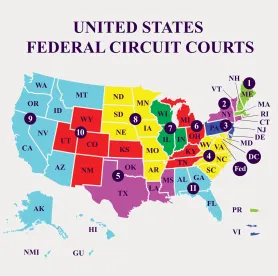This GT Report Summarizes Recent Class-Action
Decisions From Across the United States Highlights from this issue include:
-
Supreme Court holds that serving a product market in the forum state is sufficient for specific personal jurisdiction in product liability lawsuits even when the product was not designed, manufactured or sold in that market.
-
First Circuit looks to recent Massachusetts decision in upholding order compelling individual arbitration and dismissing putative class action based on an online “clickwrap” agreement.
-
Second Circuit holds that a district court can sua sponte decertify a class after class certification, even absent a significant intervening event.
-
Third Circuit finds mootness of individual plaintiff’s claim renders class claims moot.
-
Fourth Circuit rejects predominance arguments and affirms certification of class asserting breach of contract and unconscionable inducement claims.
-
Fifth Circuit rejects conditional certification process in FLSA collective actions, articulating a new standard requiring district courts to make final certification decisions before allowing cases to proceed.
-
Fifth Circuit rules that the Daubert standard applies to expert opinions at the class certification stage.
-
Sixth Circuit holds that non-expert evidence need not be admissible at the class certification stage.
-
Seventh Circuit reverses class certification where the concept of employment based “ambient harassment” is insufficient to satisfy Rule 23 requirements given the class definition.
-
Arkansas Supreme Court affirms class certification where public records and objective criteria aid in ascertaining the class.
-
Ninth Circuit remands price fixing class action for consideration of evidence that more than a “de minimis” portion of class members was not injured.
-
District court in the D.C. Circuit rules that CAFA jurisdiction is improper unless the complaint itself invokes the class action rule or mechanism.
U.S. Supreme Court | First Circuit | Second Circuit | Third Circuit | Fourth Circuit | Fifth Circuit | Sixth Circuit | Seventh Circuit | Eighth Circuit (Arkansas Supreme Court) | Ninth Circuit | Eleventh Circuit | D. C. Circuit
First Circuit
Emmanuel v. Handy Techs., Inc., No. _________, 2021 U.S. App. LEXIS 8467 (1st Cir. Mar. 22, 2021)
First Circuit affirms dismissal of putative class action and order compelling individual arbitration based on arbitration agreement entered into through an online “clickwrap” agreement.
The complaint in this case asserted wage and hour claims against a company that operated an online platform allowing users to obtain house cleaning and other home-related services. Service providers were required to complete an application, after which the defendant would provide a personal identification number for providers to access a smartphone app, enabling them to connect with defendant’s customers who were seeking services. Plaintiff was a service provider who filled out the application and downloaded the app to connect with customers. To use the app, the plaintiff was required to click a “Confirm” button signifying plaintiff’s agreement with various items and then to “Accept” the defendant’s independent contractor agreement, which contained a mandatory arbitration clause.
Based on Kauders v. Uber Technologies, Inc., 486 Mass. 557 (2021), a recent decision by the Massachusetts Supreme Judicial Court, the First Circuit concluded that plaintiff formed an arbitration agreement. According to Kauders, to form an online contract under Massachusetts law, a user of an online interface must be given “reasonable notice of the terms” of the agreement and must make a “reasonable manifestation of assent to those terms.” The First Circuit explained that the “reasonable notice” requirement was satisfied, according to Kauders, when a user has “actual notice” of its terms, which would occur when a user reviews or “interacts” with the terms before agreeing to them. As further explained in Kauders, even absent actual notice, this notice requirement may be satisfied if “the totality of the circumstances” indicates that the user was provided with such notice of the terms. Similarly, as to whether a user manifests assent to the contract terms, a court may look at “clickwrap” agreements (where a user is “required to expressly and affirmatively manifest assent to an online agreement by clicking or checking a box that states that the user agrees to the terms and conditions”) or, absent such express assent, a court may look again to the “totality of the circumstances,” including whether “the connection between the action taken and the terms is []clear” and whether “the action taken . . . clearly signif[ies] assent.”
Based on these criteria, the First Circuit concluded the plaintiff’s selection of “Accept” while using the defendant’s app demonstrated that the plaintiff had reasonable notice of the mandatory arbitration provision in the independent contractor agreement such that the plaintiff was bound by that provision. The First Circuit came to this conclusion even though the terms of the clause were not visible on the smartphone screen unless the plaintiff scrolled down to view the clause.
Rovinelli v. Trans World Entm’t Corp., No. _______, 2021 U.S. Dist. LEXIS 37875 (D. Mass. Feb. 2, 2021)
District court dismisses putative class action with prejudice because the failure to plead sufficient facts to satisfy Rule 23’s commonality and predominance requirements resulted in lack of subject matter jurisdiction.
The district court dismissed with prejudice a putative class action complaint alleging that plaintiffs were individually solicited at the point-of-sale to purchase what they were led to believe would be “free” subscriptions, but were later charged for the subscriptions in violation of the Massachusetts Consumer Protection Act, Mass. Gen. Laws c. 93A. The district court ruled that the complaint did not plead sufficient facts associated with each putative class member’s claim, and thus concluded that the pleading “irreparably lacks key dimensions of commonality and predominance that are required to adjudicate claims as a class action” in federal court. As the action could not proceed as a class action, the district court further concluded that it lacked subject matter jurisdiction over the entire complaint because the amount in controversy as to the plaintiffs’ individual claims was less than the $75,000 jurisdictional minimum. In addition, the district court declined to allow a substitute plaintiff and further amendment to cure the defects for two reasons. First, “no conceivable amendment . . . could overcome, on behalf of the class as a whole, the hurdle created by the need for particularized details regarding each putative member’s experience” at the point of sale. Second, the plaintiffs already had three chances to plead a proper putative class action but failed to do so.
As to the class action requirements, the district court explained that the Rule 23(a)(2) commonality and 23(b)(3) predominance requirements were “plainly insurmountable issues[.]” Specifically, although class actions have been certified based on oral misrepresentations, those types of actions relied on evidence of a “standardized sales pitch.” Here, the plaintiffs did not allege the sales pitch was scripted; rather, they merely cited anonymous online reviews allegedly written “by unhappy customers and disaffected former employees.” Far from evidencing a uniform script, the reviews “indicate that critical disparities exist between customers’ experiences at the check-out counter.” As explained by the district court, “each individual conversation is critical to Plaintiffs’ proof of what they understood when they enrolled in the VIP and/or magazine programs during check-out.” Thus, citing Wal-Mart Stores, Inc., v. Dukes, 564 U.S. 338 (2011), the court concluded that “[t] he necessity to address critically important issues through individualized determinations meaningfully erodes the ability to satisfy the commonality requirement for a class action.”
The district court further concluded that any common questions could not possibly predominate over individual issues. In particular, according to the district court, the putative class members “would each plainly have had a unique enrollment experience based on their interactions with . . . [the defendant’s] employee during checkout. . . . [T]hey are likely to have asked questions, to which a variety of answers may have been provided.” This would require testimony concerning each transaction — by customers, store clerks, and management — to establish whether a given customer was injured by an alleged misrepresentation, omission, or deception. Accordingly, the district court explained that, as individualized issues predominated over common questions (and answers), “it is obvious even at this early stage that this case cannot properly proceed as a class action.”
Second Circuit
Second Circuit holds that, after class certification, a significant intervening event is not necessarily required for a district court to sua sponte decertify a class.
In this putative class action in which kitchen workers at Joe’s Shanghai restaurant in Flushing, Queens asserted Fair Labor Standards Act claims, the district court originally certified the proposed class and then sua sponte decertified it five days before trial. The justification the court provided was that “while there have been numerous red flags over the past few months, including counsel’s failure to adequately respond to the court’s orders and apparent attempts to delay trial, the ‘significant intervening event’ triggering decertification is counsel’s disclosure that he plans to call only two class members as witnesses at trial.” The court ultimately held a bench trial on the plaintiff’s individual claims and entered judgment in his favor, awarding him various forms of damages.
On appeal, plaintiff argued the district court abused its discretion in decertifying the class. The Second Circuit first addressed what it described as a “curious preliminary question” – that is, whether plaintiff’s success on the merits of his individual claims moots his interest in appealing the decertification of the class. The court ultimately found no mootness, drawing parallels between plaintiff’s interest in appealing the decertification order on behalf of a proposed class comprised predominantly of immigrants and “the interest of a private attorney general” seen in prior case law, whereby “the objectives of the class action device” and public policy considerations support jurisdiction. The Second Circuit then turned to the substantive question of decertification, finding that the district court “acted within its discretion in decertifying the class on the ground that class counsel was no longer adequately representing the class.” The Second Circuit noted how “[t]he record is replete with counsel’s shortcomings” and such representation “fell woefully short of the skilled and zealous representation expected of class counsel under Rule 23(g), justifying decertification.” In so doing, the Second Circuit highlighted how an “intervening event” need not necessarily be the “impetus” for decertification; indeed, a district court may simply find that Rule 23’s exacting requirements are no longer or not in fact met.
In re Teva Secs. Litig., No. 3:17-CV-558, 2021 U.S. Dist. LEXIS 43316 (D. Conn. Mar. 9, 2021)
Connecticut district court finds that a complete Daubert inquiry is appropriate in evaluating expert reports at the class certification stage.
In these consolidated putative class actions, plaintiffs alleged various securities claims against Teva and several current and former officers and employees. Plaintiffs’ motion for class certification relied on expert opinions, which defendants sought to exclude and strike. The court granted the motion for class certification and denied the motion to exclude, but in so doing, assessed whether Daubert applied at the class certification stage.
The court noted that, “[i]t is still an open issue whether and to what extent a district court should conduct a Daubert analysis at the class certification stage.” That said, the court posited that “the Supreme Court and Second Circuit have hinted that district courts should undertake a full Daubert analysis at the class certification stage, when necessary,” leading it to conduct a full Daubert analysis as to plaintiff’s expert’s opinions. This decision follows the January 2021 decision in In re Namenda Indirect Purchaser Antitrust Litig., No. 1:15-CV-6549, 2020 U.S. Dist. LEXIS 247078 (S.D.N.Y. Jan. 12, 2021), from the Southern District of New York, in which the court similarly held that a full Daubert inquiry was appropriate at the class certification stage.
Borgese v. Baby Brezza Enters. LLC, No. 20-CV-1180, 2021 WL 30216 (S.D.N.Y. Feb. 18, 2021)
S.D.N.Y. strikes class allegations at the pleadings stage, finding it clear that class certification requirements cannot be met based on the face of the complaint.
In this putative class action relating to alleged failures in the design, sale, and marketing of Baby Brezza baby formula machines, the defendant manufacturer moved to strike the class allegations under Fed. R. Civ. P. 23(d)(1)(D). Noting that “[t]he plausibility standard applies to such motions” and that the court may “strike the class allegations at any practicable time after the suit has been filed” if the complaint demonstrates an inability to satisfy the class certification requirements, the court ultimately granted the motion.
In so ruling, the court highlighted that the complaint “does not indicate where the other purchasers of the Baby Brezza machines reside, where they purchased the machines, or where they may have suffered any resulting injury,” making the court “unable to determine which state laws apply, and in turn, whether those laws materially differ.” Accordingly, it cannot “determine whether common questions of law predominate because the Complaint fails to identify any other potential state’s law outside New York.” The court also highlighted how the complaint provides “only conclusory allegations about the existence of other class members” and provides “no other information about, or similarities among, the purported class members”– overall, rendering entitlement to class treatment implausible.
Third Circuit
Laspina v. SEIU Pennsylvania State Council, 985 F.3d 278 (3d Cir. 2021)
Third Circuit finds mootness of individual plaintiff’s claim renders class allegations moot as well.
Plaintiff in this putative class action resigned from her union because she protested the union fees that were required and sought an order recognizing her resignation and requiring the union to cease deducting union fees. The district court found that these claims were moot because the union complied with plaintiff’s requests for relief and thus her claims failed to present a justiciable claim or controversy as required for Article III standing. The Third Circuit agreed that plaintiff’s claim was moot and that the voluntary cessation doctrine did not apply because the union was not challenging the disputed conduct.
The panel next considered whether the class allegations could proceed even though plaintiff’s individual claim was moot. The panel recognized that, for example, “when a plaintiff files a motion to certify a class when his individual claim still is live, the mooting of that claim while the motion is pending permits the court to decide the certification motion” and that plaintiff still could pursue class allegations. The panel distinguished the circumstances before it, however, because plaintiff “has not yet moved for class certification and maintains no personal stake in the resolution of this claim. The lack of personal stake in the resolution of the claim makes [plaintiff] a particularly inappropriate class representative.” Accordingly, the panel affirmed the dismissal of the class allegations as well.
Editors: Robert J. Herrington & Stephen L. Saxl & Co-authors: Aaron Van Nostrand, Kara E. Angeletti, Andrea N. Chidyllo, Gregory Franklin & Brian D. Straw








 />i
/>i

